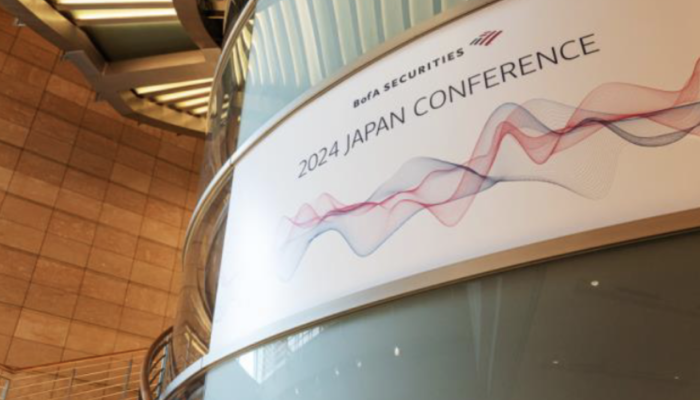The 2024 annual BofA Global Research Japan Conference buzzed with optimism and enthusiasm as representatives from some 500 global investors and 200 leading Japanese companies gathered in Tokyo to understand whether after multiple false starts, Japan has finally seen the end of its low-interest-rate, low-inflation, and low-wage environment.
Decoding Japan’s comeback story and opportunities for the world

BofA Global Research 2024 Japan Conference
“I believe this turnout reflects strong interest in Japan, as well as increasing engagement Japanese corporates are having with global investors,” said Tamao Sasada, Country Executive for Japan for Bank of America, during her opening remarks.
The September conference was timely, coming soon after the Bank of Japan raised interest rates for the first time in 17 years in July, which was followed by the historic one-day decline in the Nikkei in August 2024, with investors searching for investment opportunities amid the recent dislocation.
Speakers from various sectors and disciplines offered balanced views of a major economy that may at last be in the early innings of a domestic revival, but that is navigating persistent global uncertainties.
Reflation, reforms and returns
Taking a broad perspective on Japan’s big transformations, Izumi Devalier, Head of Japan Economics at BofA Global Research, argued that rising wages, which are likely to be sustained given secular headwinds from an aging and declining population, are likely to support the inflation trend into the future.
What is happening right now is a transitional period for Japan, where the structural changes to the economy are sowing the seeds I think for higher productivity down the line,
she said. That productivity bump could be catalyzed by the ongoing progress of corporate governance reforms started more than a decade ago. As Japan Exchange Group, Group CEO, Hiromi Yamaji, a leading proponent of corporate reform, observed, trends such as improving earnings, the accelerated unwinding of cross-shareholdings and rising M&A transactions all indicate that Japanese companies are increasingly using capital more efficiently and unlocking value for shareholders. In fact, the prospect of increased shareholder returns from these corporate reforms has attracted record foreign fund flows to Japan in recent years.1
The reforms are not only on the surface of companies’ management. The aim is to go deeper and transform corporate mindset and culture. It will take time for the efforts to bear fruit, but as we continue this path, those waiting for the right moment can expect more growth in Japan,
he assured the audience.
Geopolitical dynamics and tech disruptions
Other speakers highlighted how external factors could impact Japan’s positive outlook. Although Japanese rates have risen, Shusuke Yamada, Japan Chief FX & Rates Strategist for BofA Global Research, expects the yen to remain weak as long as the carry trade remains attractive and until the structural flow of outbound Japanese investments reverse. The carry trade is, Yamada explained, influenced by U.S. interest rate policy – by how much, how soon and how sustained the Federal Reserve’s rate cuts will be while structural outflows are driven by demographics, which has a higher hurdle to overcome.
Claudio Irigoyen, Head of Global Economics at BofA Global Research, also reminded the audience that three key events could upend global economic forecasts: the new U.S. administration’s policies, a worsening of the Chinese economy and escalation of geopolitical conflicts such as those in the Middle East.
When it came to geopolitical trends in Asia Pacific, U.S. Ambassador to Japan, Rahm Emanuel, and Elbridge Colby, a former U.S. Defense Department senior official and author of The Strategy of Denial: American Defense in an Age of Great Power Conflict, framed the current dynamics in broad terms as driven by three Cs: Covid, conflict and coercion. The speakers noted the importance of the U.S.-Japan alliance, citing the broadening of security alliances in the region from bilateral (U.S.-Japan) to trilateral (U.S.-Japan-Korea or U.S.-Japan-Philippines), and the benefits of mutual investment between these countries.
Geopolitics is not the only wild card investors have to contend with. Disruptive technologies such as artificial intelligence (AI) are also creating significant uncertainty. Record-high global AI CapEx is boosting tech industries, including the Japanese tech value chain. But from a broader perspective, AI applications have the potential to sunset other sectors too.
Alkesh Shah, Head of U.S. Software Equity Research, for BofA Global Research, emphasized that although AI can lead to job losses in industries such as professional services, deep expertise will command a premium in the AI era.
“Where I do think it's going to be really important for jobs and for people is domain knowledge, because these models aren't going to have the domain expertise. They're not going to have the judgment. For those people who actually have expertise in industry, know how to ask the right questions and know how to interpret the right answers, there will be a lot of jobs for them,” said Shah.
Taking it forward
Over four days of insightful discussions focused on the most pressing Japan-relevant investment topics, it became clear to the 1,200 conference participants that the unfolding opportunity in Japan is more nuanced than many media headlines suggest.
Deep local market knowledge is key to understanding how Japan’s new outlook will play out in practice. With 77 years of experience in Japan, Bank of America has extensive domestic and international networks that will help investors access leading insights and potentially rewarding and enduring opportunities in this new cycle of Japan’s growth.
To learn more about Bank of America’s international business, please get in touch with your relationship manager.
1 Reuters, “Foreign flows into Japan stocks topped 6 trln yen in 2023,” January 2024.


